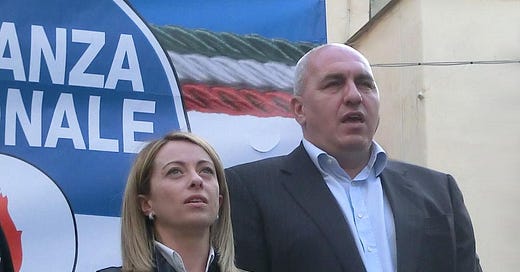Italy’s neo-fascist PM is just what NATO, bankers ordered
Return to Mussolini politics fits right in with U.S. priorities in Europe
Thanks for reading another edition of Contention! This bullet’s-eyed-view will take about four minutes to read. Like what you see? Make sure you’re following us on Twitter and if you like it, please share it:
Italy’s incoming government is settling into place after the election of Giorgia Meloni of the Brothers of Italy, a far-right political party which traces its origins to neo-fascist politics. Meloni’s history of praising Benito Mussolini and Giorgio Almirante, Italy’s wartime minister of culture, set off alarm that Italy is about to move in a very different direction from a consensus defined by support for European Union and NATO policy.
That does not appear to be likely at all. Meloni has confirmed since her victory that she will be looking out for her party’s most important interests: global financial institutions, NATO-aligned arms dealers, and big business at large.
Markets are sensitive to abrupt changes given Italy’s economic precarity. Inflation is running at 8.9% – the highest in 37 years – and the new government may have to begin energy rationing due to its dependence on Russian natural gas. Energy prices are up 45% and will likely rise further after sabotage to the Nord Stream 2 pipeline. Confcommercio, the country’s chamber of commerce, is warning that 120,000 service-sector firms could go bankrupt in the next 10 months. The manufacturing industry is in recession. This all comes as Italy suffers from its worst drought in 70 years.
But the Financial Times considered Meloni’s victory to “merit concern but not panic,” citing the indifference of the financial markets. Their only worry: that Meloni might boost public spending on pensions and family benefits. “The concerns raised by the Financial Times will be resolved in the space of one night,” a Brothers of Italy source told the daily newspaper La Stampa. “The one in which we will make known who will be the Minister of Economy.”
Meloni preferred Fabio Panetta, the former director general of the Bank of Italy and a strong advocate of the European single market, but he’s out of the running as it would cost Italy a seat on the European Central Bank’s executive board. Two other names from the era of former prime minister Silvio Berlusconi, Morgan Stanley investment banker Domenico Siniscalco and liberal economist Dario Scannapieco, are the runners up. There’s also Giancarlo Gioretti, outgoing prime minister Mario Draghi’s economic development minister and a graduate of the neoliberal Bocconi School.
Another sign of Meloni’s direction: the defection during the campaign of former finance minister Giulio Tremonti, a “staunch defender of free-market policies,” to Meloni’s camp. During Tremonti’s time in the job, Italy lowered corporate tax rates, abolished inheritance taxes, and signed off on one of Europe’s toughest post-2008 austerity packages.
The running theme has been continuity – and saying one thing and then switching gears. Meloni campaigned on stopping the privatization and sale of state-owned ITA Airways, then reversed her position, now backing Draghi’s plans. Draghi was previously head of the European Central Bank, and Meloni had criticized him for being in the thrall of global finance.
Meloni’s commitment to NATO is also not surprising. Brothers of Italy’s co-founder, businessman and arms dealer Guido Crosetto, is president of Italian military-industry trade federation AIAD, which “maintains strong relationships with national, international or NATO related institutions in order to promote, represent and guarantee the interests of all its industries.”
This alliance includes long-standing weapons firms such as Beretta, shipbuilder Fincantieri and aerospace giant Leonardo which jointly manufactures F-35 Joint Strike Fighters (JSF) at an Italian air force base west of Milan for the European market -- one of only three JSF factories in the world. Italy’s air force and navy plans to eventually procure 90 of the costly fighter jets for “expeditionary missions.”
Crosetto, who served as a member of parliament while simultaneously heading up AIAD, also emerged as an interlocutor between Meloni and the business world, establishing contacts between the new prime minister and the financial giants and investment banks of the City of London.
In tandem with the pro-NATO policy, Meloni has said Italy joining China’s Belt and Road Initiative as a cooperating member was a “big mistake,” wants to cancel the deal, and has vowed support for Taiwan separatists. This could be to the further benefit of Italian arms manufacturers which have inked deals with Taiwan. Meloni disapproved of sanctions on Russia, but then swapped positions to say they are working.
Which is all to say that Meloni is moving with the tide. Whether recognized or not, the decisions regarding Italy’s major issues – on the question of financial measures, and war and sanctions – are made by NATO and the United States. Far from worried about Meloni’s fascist roots, her ideological commitments might be more profitable than ever for them.
Disclaimer
Our only investment advice: Den Harrow is not a forecaster.
Contact us with questions, perspectives, feedback, or stories we might have missed.




